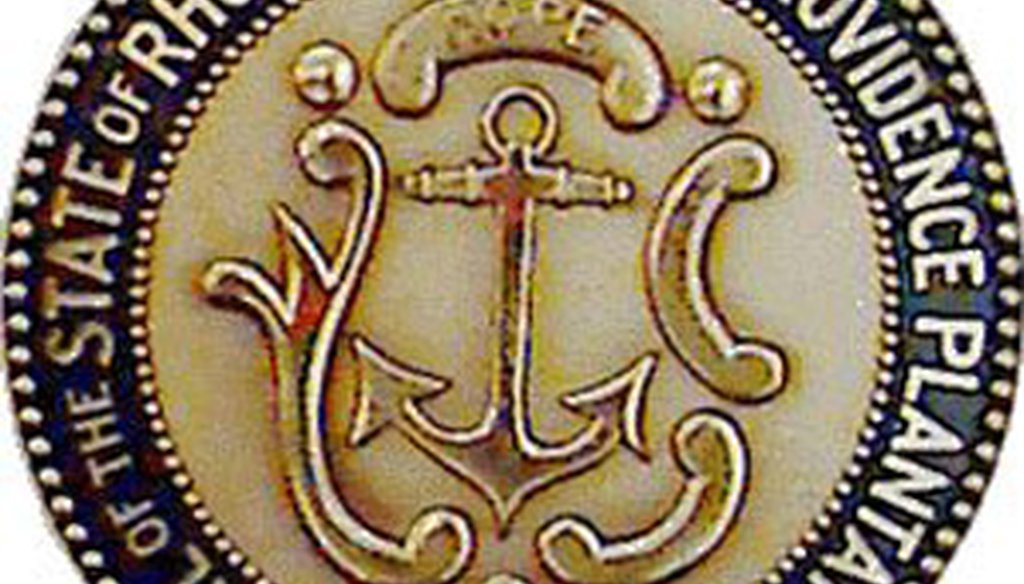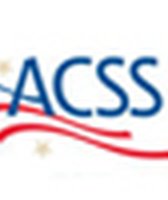Stand up for the facts!
Our only agenda is to publish the truth so you can be an informed participant in democracy.
We need your help.
I would like to contribute

The current Rhode Island state seal.
For years, Rhode Island's official name has been a source of controversy. That's because it's not just "Rhode Island," it's "State of Rhode Island and Providence Plantations" -- a mouthful that some say conjures up connotations of slavery.
Efforts to change the name simmered in the General Assembly until 2009, when a group of legislators made it a priority to push for a change, offering fervent testimony about the centuries of hurt they said was carried forth on the state seal.
Moved by their arguments, the legislature overwhelmingly agreed to put the question before voters this November. Should the state drop "and Providence Plantations" from its name?
With the election just a few weeks away, the issue came up Oct. 6 during a WPRI/Providence Journal gubernatorial debate, when moderator Tim White asked candidates whether they support changing the state's name.
Three of the four candidates at the debate -- Democrat Frank Caprio, Republican John Robitaille and Moderate Ken Block -- answered that no, they did not. Lincoln Chafee also responded no, but then added: "our name is listed in the U.S. Constitution, it would take a constitutional amendment."
It was a passing answer that raised an interesting question about the coming referendum. Would the U.S. Constitution need amending should Rhode Island voters decide in favor of the abridged title?
Opponents of the change argue that the state's name has been part of history for nearly 400 years, reflecting an era when the word "plantation" referred to local farming settlements and had nothing to do with slavery.
Chafee's comment was the first time we'd heard anyone question whether it's permissible under the U.S. Constitution to change the name of a state.
We asked Chafee's team where he got that information. The answer was several days in the making. First they told us they would provide the source of the comment. Then the former senator himself explained that the statement simply represented his own beliefs based on conversations with his campaign lawyer. He was not citing any specific source, he said.
But by then he'd piqued our interest.
We sent queries posing the question to more than a dozen preeminent constitutional scholars across the country. We spoke with four. Their conclusion: there is no precedent on the name change issue, and therefore no definitive answer.
None of the experts could remember the last time a state changed its name.
But let's back up a bit. The words "Rhode Island and Providence Plantations" appear just once in the U.S. Constitution, in Article 1, Section 2, which deals with taxation and congressional representation. Because that language was superseded by other amendments, it doesn't appear that section would need to be changed, the experts told us.
Perhaps more importantly, the constitutional scholars all said that the 10th Amendment would give the state the authority to decide the naming question on its own. The amendment reads: "The powers not delegated to the United States by the Constitution, nor prohibited by it to the States, are reserved to the States respectively, or to the people."
Put simply, if the U.S. Constitution does not mention a legislative power, or specifically bar it, a state is free to decide the matter.
Consequently, Prof. Jared Goldstein of the Roger Williams University Law School said, "Rhode Island has sovereignty to decide various aspects of government on its own." That includes the naming issue.
"I'd see no reason why the federal government would even have a say in the matter," added Steve Frank, of the National Constitution Center, a Philadelphia-based nonprofit organization that focuses on increasing public awareness of the Constitution.
Prof. Jason Mazzone, of Brooklyn Law School, noted that while Article 4, Section 3 of the Constitution does prohibit "the formation of a new state within the jurisdiction of an existing state ... changing the name of an existing state does not create a new state within the meaning of that provision."
Collectively, the experts' assessments suggest to us that Rhode Island probably wouldn't encounter any problems with the U.S. Constitution if voters elect to change the name. Yet because this question has not been tested, it's difficult to say for sure. Or to predict what kind of legal challenge could crop up.
Chafee said his campaign lawyer, retired District Court Judge Stephen Erickson, believes that if the name change wins approval, someone could file a challenge and there is an outside chance the question could wind its way up the federal court system to the U.S. Supreme Court.
Here's where we get stuck. We wish we could put this item to the Truth-O-Meter, especially since Chafee made a bold statement in a debate with few facts to back it up. But it's impossible for us to come to a definitive conclusion.
So for now we'll leave this statement without a ruling and put out the call for help. If you know any constitutional scholars with a different take, send them our way.
Our Sources
WPRI/Providence Journal debate, Oct. 6, 2010
United States Constitution transcript, from the National Archives, accessed Oct. 7, 2010
United States Bill of Rights transcript, from the National Archives, accessed Oct. 7, 2010
Interview, Chafee campaign spokesman, Mike Trainor, Oct. 7-8, 2010
Interview, Lincoln Chafee, Oct. 7-8, 2010
Interview, Prof. Jared Goldstein, Roger Williams University School of Law, Oct. 7, 2010
Interview, Steve Frank, chief interpretive officer, National Constitution Center, Philadelphia, Oct. 8, 2010
Email, Prof. Jason Mazzone, Brooklyn Law School, Oct. 8, 2010
Emails, Prof. Gordon Wood, Brown University, Oct. 8-9, 2010




















































